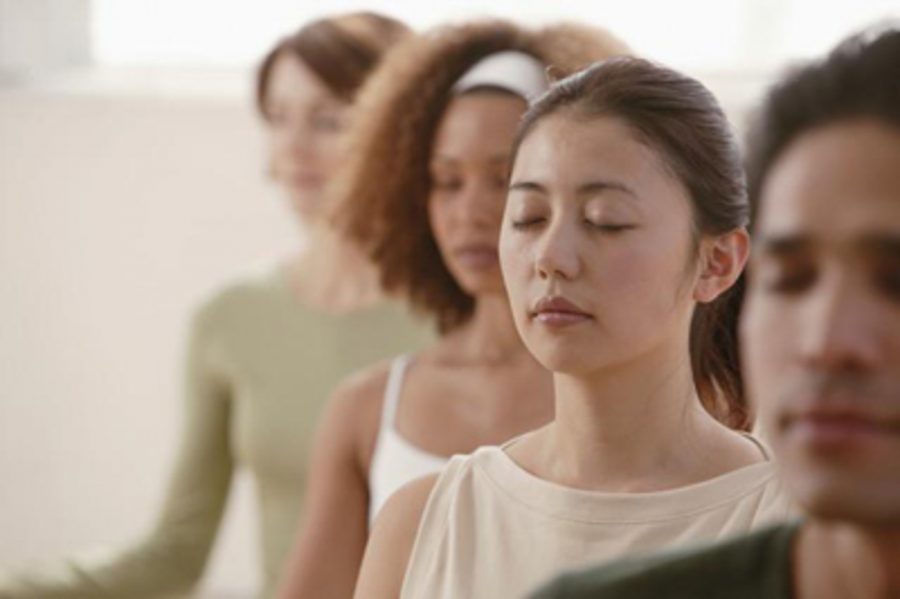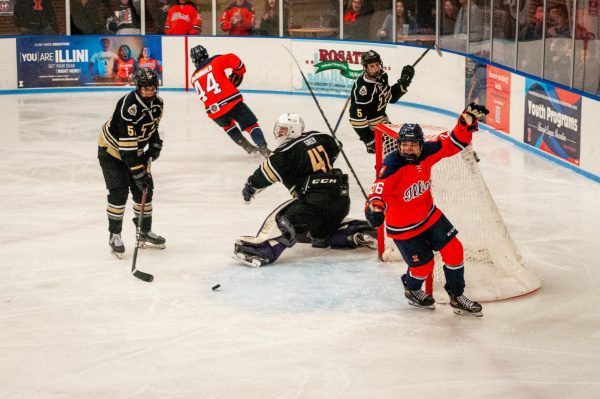Making time for mindfulness
Photo courtesy of Ananda Liina C
People meditate to find peace and center themselves.
November 1, 2016
In a culture dependent on deadlines and knowing one’s next move, it is easy for students to lose sight of what they are working toward in the first place. Sinking into stress and only focusing on the waves of work contributes to feelings of desperation and hopelessness. Mindfulness is the practice of observing without judgment with the intention to bring one back to themselves, and to a place where they are floating, not sinking.
To Write Love on Her Arms is a non-profit movement committed to raising awareness about mental health and providing access to resources. The chapter on campus fundraises for the national organization and holds meetings to educate and form a community for support. Carly Prais, treasurer of the club and senior in LAS, said the goal is to bridge the gap for students to be able to find resources they need and discuss these topics.
“Everyone is from different walks of life and at different stages of recovery, and being mindful of where each person is coming from and where they’re at on their journey (is important),” Prais said.
Alisha Qazi, president of the club and senior in AHS, explained how past personal experiences led her to TWLOHA. Due to these experiences Qazi found interest in being a part of something where these topics are brought into light instead of being generalized or not discussed at all. Qazi said there are still many stigmas circulating around mental illness, but practicing mindfulness to her is a way to reduce judgment and try to understand those around her.
“Knowing that there are two sides to every story, and what we see and interpret is just one thing, but we don’t know what’s on the other side,” Qazi said.
Get The Daily Illini in your inbox!
Mindfulness can also take the shape of meditation, a grounding technique where individuals sit in silence and stillness for a short period of time. At the Ananda Liina yoga center in Urbana there are meditation lessons and retreats for people who want to increase their self-awareness and reduce any tension they may be holding onto. Dada Vedaprajinananda is the resident teacher at the center and said the benefits of meditation are only earned when the practice is incorporated into one’s daily life.
Vedaprajinananda started meditating in 1970. He said he was inspired by an Indian monk he met in California, and his life has been transformed ever since.
“The goal of the center is to help as many people as possible learn these practices so they can use them and benefit their lives,” Vedaprajinananda said.
At Ananda Liina, mindfulness is taught by focusing on one’s mind and emotions. Through singing and meditation on the mantra, “Baba Nam Kevalam,” which translates to “Love is all there is,” the center dives deeper into this positivity and encourages its participants to do the same in order to resonate with the concept and allow it to spread into their lives.
Vedaprajinananda recognized that the hardest part of meditation can be setting aside time to incorporate it into one’s day, but said the rewards from practicing help one to achieve more in a day.
TWLOHA members also agreed that taking time for oneself is essential for maintaining and improving mental health. The organization, like Ananda Liina, promotes the idea that anyone can benefit from deciding to pause amid the hustle and take a moment to reevaluate how one is doing.
“(One should) realize that you shouldn’t push yourself to the nth degree to do all of the things you’re supposed to be doing, you should be focused on yourself and getting the help you need. Whether that is clinical treatment or spending time on your own,” Prais said.
The mission of mindfulness shows up in different ways in individuals’ lives, but the end result is the same. Becoming more compassionate towards oneself and allowing from an observational perspective of the surrounding world enables space for positive change.
Qazi said it is essential to realize recovery happens at different paces and there can be a misconstrued assumption once conditions begin to improve, a person is better forever. Noting the challenges and one’s power to overcome them is crucial to not only healing, but living.
Vedaprajinananda said students are vital when it comes to affecting the world and making it a little better.
“This age is a very important age, young people are the ones who can do something. They should think they aren’t a helpless person,” Vedaprajinananda said. “In this universe there’s a giant force where everything is pushing it, and they should think that same force that is pushing the universe is within them, they can awaken that.”







